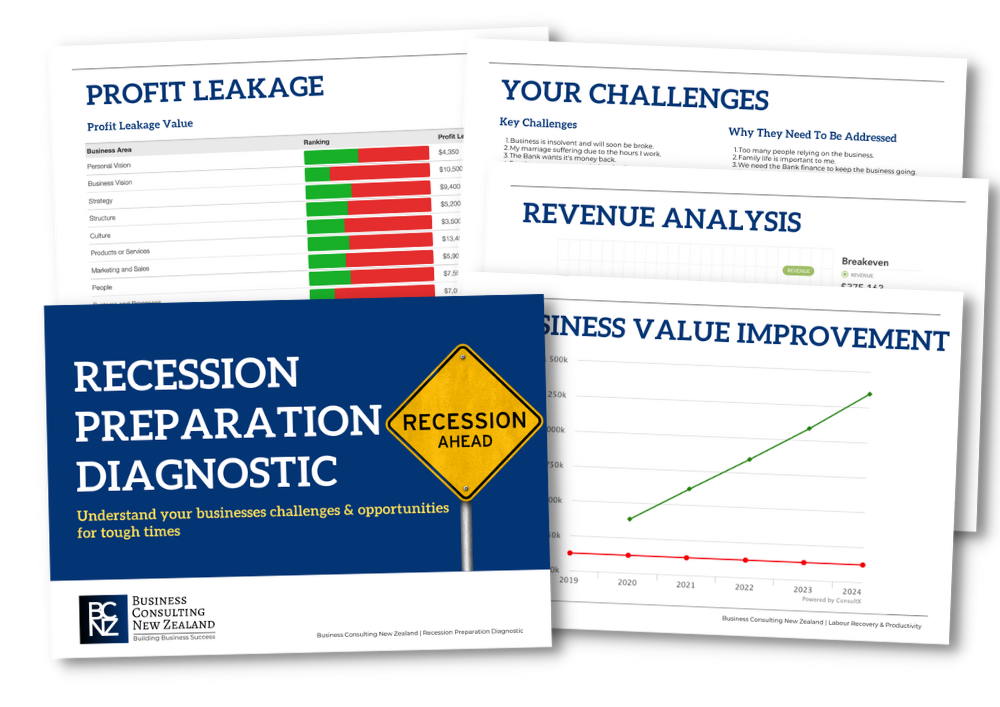Recession Proof Your Business
7 Tips to protect your asset and make the most of opportunity
The Business Community are all discussing one thing right now: Recession.
While an immediate recession isn't yet certain, we know that business is cyclical, and a recession will come sooner or later. The question this article will answer is; what can you do to de-risk and even make the most during a recessionary period?
What is a recession?
The New Zealand Government doesn't have an official measure or definition of a recession, however, according to Investopedia, it is "typically recognized as two consecutive quarters of economic decline, as reflected by GDP" however, there is now a more modern measurement: "National Bureau of Economic Research (NBER) defines a recession as a significant decline in economic activity spread across the economy, lasting more than a few months, normally visible in real GDP, real income, employment, industrial production, and wholesale-retail sales".
When was the last recession?
Based on the first definition, the most recent recession in New Zealand was in the first two quarters of 2020 due to the COVID-19 Pandemic as seen in data from Stats NZ.
The Global Financial Crisis (GFC) or the Great Recession starting in 2008 is commonly recognised as our most recent major recessionary period.
Strategies for Recession Proofing Your Business
Good business practices will help you in good times and in difficult times. Here are some of the top tips that we'd recommend to all business owners, particularly with a recession nigh.
1. Improve Profitability
This may sound simplistic, or even silly, but in times of uncertainty, it can be forgotten. And in times of high inflation, as we're experiencing now, profitability is quickly diminished. To survive a recession, you need to make a profit, have cash in your back pocket, or both. You can improve gross and net profitability by:
Increasing revenue
Increasing prices & or margins
Reducing the cost of sales
Reducing overheads
Improving employee productivity
Improving production productivity
Reducing wastage
Measurement of profit leakage and returning it to your bottom line (we can help you do this for free – click here)
2. Grow your Business
Grow to offset a slow-down. Often a recession will squeeze the revenue and size of your business. To reduce this impact, you should attempt to grow revenue and increase your market share before a recession hits hard.
Deepen relationships and implement strategies to sell more to existing customers
Offer additional services and products to broaden your market
Find new customers through sales and marketing
3. Keep marketing
When considering expenses, marketing is often one of the first to get the cut. Although it may seem counter-intuitive, you must keep marketing to ensure you stay alive and even grow. If you can out-live other businesses in your industry, you will find naturally be able to fill the void they have left.
Ensure your marketing budget is used in the most effective manner possible
Explore low-cost/high-impact marketing techniques
Market to customers of businesses who have failed
Do not stop marketing!
4. Build up Cash Reserves
Cash will keep you going if times get very tight, as well as offer the opportunity to expand at a discounted rate when other businesses are struggling or even fail altogether.
Turn a profit, and keep that profit in the business
Setup as many lines of credit as possible, as it is much easier to get credit before a recession than during when it's often needed
Sell any unused assets
Sell down slow-moving and obsolete stock
Tighten credit terms with customers if possible (reducing exposure to others in financial strife)
Hire or lease any plant or machinery required to keep cash reserves high
5. Actively manage finances
Money is the lifeblood of your business, and you need to ensure it continues to flow. Closely monitoring finances will give you an accurate understanding of your position, and guide you to make any changes required.
Keep an up-to-date cash flow forecast
Manage debtors and creditors closely
Follow up on overdue accounts immediately and do everything you can to minimize the chance you won’t get paid.
6. Make the most of a Recession
It doesn't have to be all doom-and-gloom during a recession. If you've put yourself in a good position by improving profitability, building up cash reserves and growing your customer base, there will be discounted opportunities to expand. We recommend keeping your ear to the ground for the following opportunities:
Buyout other companies for very low prices
Buy customer lists
Take on difficult-to-find staff that have been let go by other companies
Buy used plant and machinery
Buy stock
Take market share from companies that stopped marketing, or have failed.
7. Personal Protection
Take precautions as early as possible to protect your personal and family assets. We recommend talking to your lawyer about the best Trust and business structure to limit your personal exposure should your business be the victim of a recession, which may be outside of your control.
Take Action!
It's easy to read this advice and not act on it - but that will make life more difficult in the long run. To help you decide where to start, we're offering all New Zealand businesses a free Business Diagnostic assessment. This will help you understand the areas of your business that need the most attention before or during a recession.

